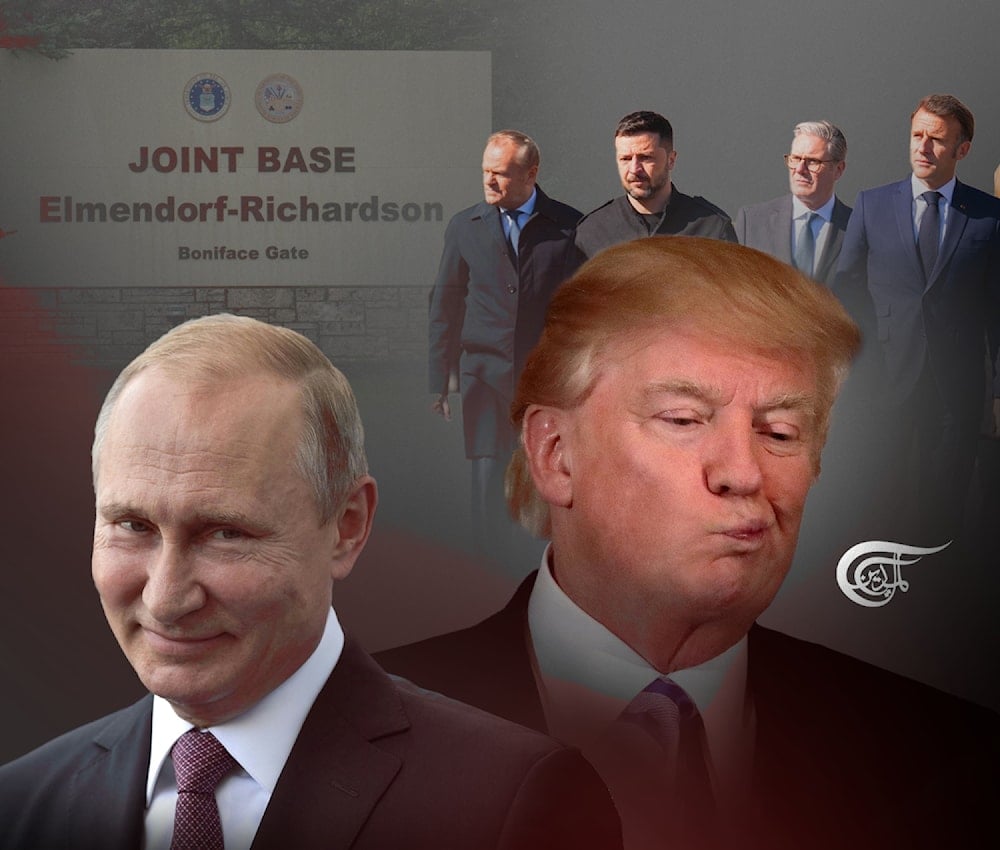6 hours in Alaska: A meeting that empowered Putin with little progress on peace
Billed as a potential turning point for the ongoing war in Ukraine, the meeting failed to produce significant breakthroughs toward a ceasefire or peace agreement.
-

Putin scores optics at Alaska summit, Ukraine left uneasy (Illustrated by Mahdi Rtail for Al Mayadeen English)
On August 15, 2025, a highly anticipated six-hour summit between US President Donald Trump and Russian President Vladimir Putin took place at Elmendorf-Richardson Air Force Base in Alaska. Billed as a potential turning point for the ongoing war in Ukraine, the meeting failed to produce significant breakthroughs toward a ceasefire or peace agreement. Instead, it provided Putin with a notable strategic victory, enhancing his global image while leaving Ukraine and its Western allies increasingly concerned about the future.
The summit was marked by carefully choreographed optics that played into Putin’s hands. Despite Russia’s international isolation due to Western sanctions and condemnation of its actions in Ukraine since 2022, Putin was greeted with a red-carpet welcome, complete with military flyovers and a ride in Trump’s armored limousine, “The Beast". These visuals projected an air of legitimacy for Putin, countering years of efforts by Western nations to marginalize him. For a leader often portrayed as a pariah, this warm reception was a diplomatic coup, signaling to both domestic and international audiences that Russia remains a formidable player in global politics.
The discussions, described by both leaders as “productive", spanned six hours but yielded no concrete agreements. Trump, known for touting his deal-making skills, emerged from the summit admitting that no ceasefire deal had been reached, offering only vague assurances of “progress” and a promise to follow up with a call to Ukrainian President Volodymyr Zelensky. On his way back to Washington, Trump held a lengthy phone conversation with Zelenskyy, though details of the discussion remain undisclosed, raising further speculation about the direction of US policy toward Ukraine.
Putin, meanwhile, reiterated Russia’s demands for territorial concessions and a redefinition of Ukraine’s geopolitical alignment, framing these as necessary to address the conflict’s “root causes". This rhetoric, consistent with Moscow’s long-standing narrative, underscored Putin’s unwillingness to compromise on core issues.
The summit delivered three key advantages for Putin.
First, it served as a powerful act of diplomatic rehabilitation. By engaging directly with the US president, Putin projected an image of equality with the leader of the world’s most powerful nation. This moment was particularly significant given the West’s efforts to isolate Russia diplomatically and economically. The summit’s high-profile nature allowed Putin to portray himself as a statesman engaged in serious negotiations, rather than an ostracized leader.
Second, the absence of a ceasefire agreement ensures that Russia’s military campaign in Ukraine can continue uninterrupted. With Russian forces making incremental gains in eastern Ukraine, the lack of progress in Alaska buys Moscow time to pursue its battlefield objectives, further straining Ukraine’s resources and testing the resolve of its Western backers, who face domestic pressures to reduce support for Kiev.
Third, Trump’s warm reception of Putin and his public suggestions that Ukraine should “make a deal” to end the war have raised concerns among NATO allies. These comments risk undermining the alliance’s united front against Russian aggression, a cornerstone of Western policy since the conflict began. Trump’s apparent openness to negotiations that could favor Moscow has sparked fears that the US might pressure Ukraine into concessions that compromise its sovereignty, potentially emboldening Putin and sowing division among Western allies.
For Trump, the summit was an opportunity to reassert his relevance on the global stage. Having once claimed he could resolve the Ukraine conflict in “24 hours", he left Elmendorf-Richardson with little to show beyond a commitment to continue discussions.
The lack of tangible progress deepened concerns in Kiev, where leaders fear being sidelined in negotiations that could determine Ukraine’s future. Putin’s suggestion of a follow-up summit in Moscow further reinforced his narrative of Russia as a global power capable of dictating the terms of international dialogue.
Conclusion
Recent developments suggest that a key outcome of the Alaska summit on August 15, 2025, was Trump’s push for Ukraine to cede territories to Russia in exchange for a ceasefire and peace agreement. It is now clear that Putin is seeking territorial concessions as a condition for ending hostilities, while Trump’s intentions to broker such a deal have become more apparent. The summit, while still unable to alter the war’s trajectory, highlighted Putin’s skill in leveraging diplomacy to advance Russia’s interests. For Ukraine and its supporters, the meeting at Elmendorf-Richardson underscored the challenges of navigating a high-stakes geopolitical landscape, with the specter of Russian advances and elusive prospects for meaningful negotiations looming large.

 Ashkan Mombeini
Ashkan Mombeini
 5 Min Read
5 Min Read









